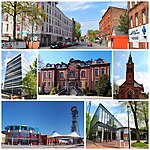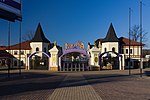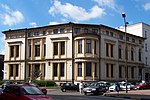Katowice (UK: KAT-ə-VEET-sə, US: KAHT-, Polish: [katɔˈvitsɛ] (listen); Silesian: Katowicy; German: Kattowitz; Yiddish: קאַטעוויץ, romanized: Kattevitz) is the capital city of the Silesian Voivodeship in southern Poland and the central city of the Upper Silesian metropolitan area. It is the 11th most populous city in Poland, while its urban area is the most populous in the country and one of the most populous in the European Union.
Katowice has a population of 286,960 according to a 31 December 2021 estimate. Katowice is a central part of the Metropolis GZM, with a population of 2.3 million, and a part of a larger Upper Silesian metropolitan area that extends into the Czech Republic and has a population of 5-5.3 million people.Throughout the mid-18th century, Katowice developed into a village following the discovery of rich coal reserves in the area. In the first half of the 19th century, intensive industrialization transformed local mills and farms into industrial steelworks, mines, foundries and artisan workshops. The city has since reshaped its economy from a heavy industry-based one to professional services, education and healthcare. The entire metropolitan area is the 16th most economically powerful city by GDP in the European Union with an output amounting to $114.5 billion.
Katowice has been classified as a Gamma - global city by the Globalization and World Cities Research Network and is a centre of commerce, business, transportation, and culture in southern Poland, with numerous public companies headquartered in the city or in its suburbs including energy group Tauron and metal industry corporation Fasing, important cultural institutions such as Polish National Radio Symphony Orchestra, award-winning music festivals such as Off Festival and Tauron New Music, and transportation infrastructure such as Katowice Korfanty Airport. It also hosts the finals of Intel Extreme Masters, an Esports video game tournament. Katowice is also home to several institutions of higher learning, notably the University of Silesia, the Silesian University of Technology and the Karol Szymanowski Academy of Music.












